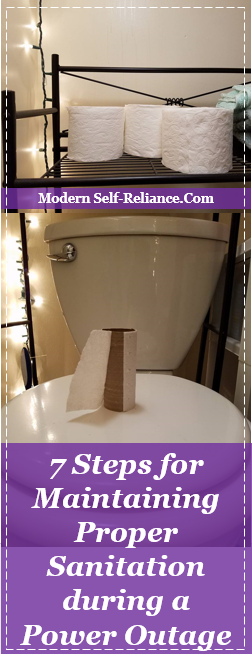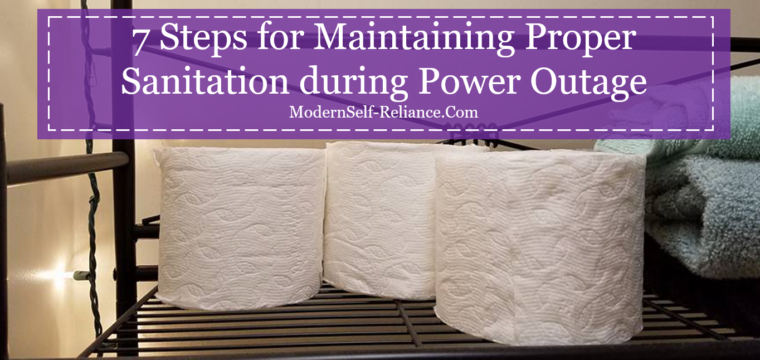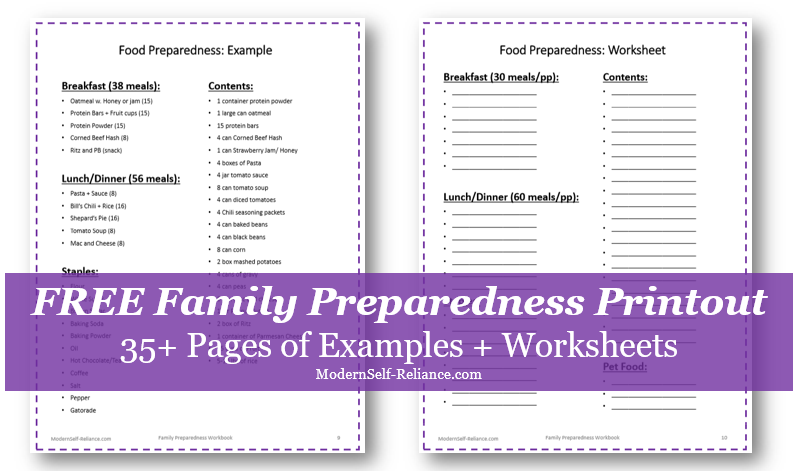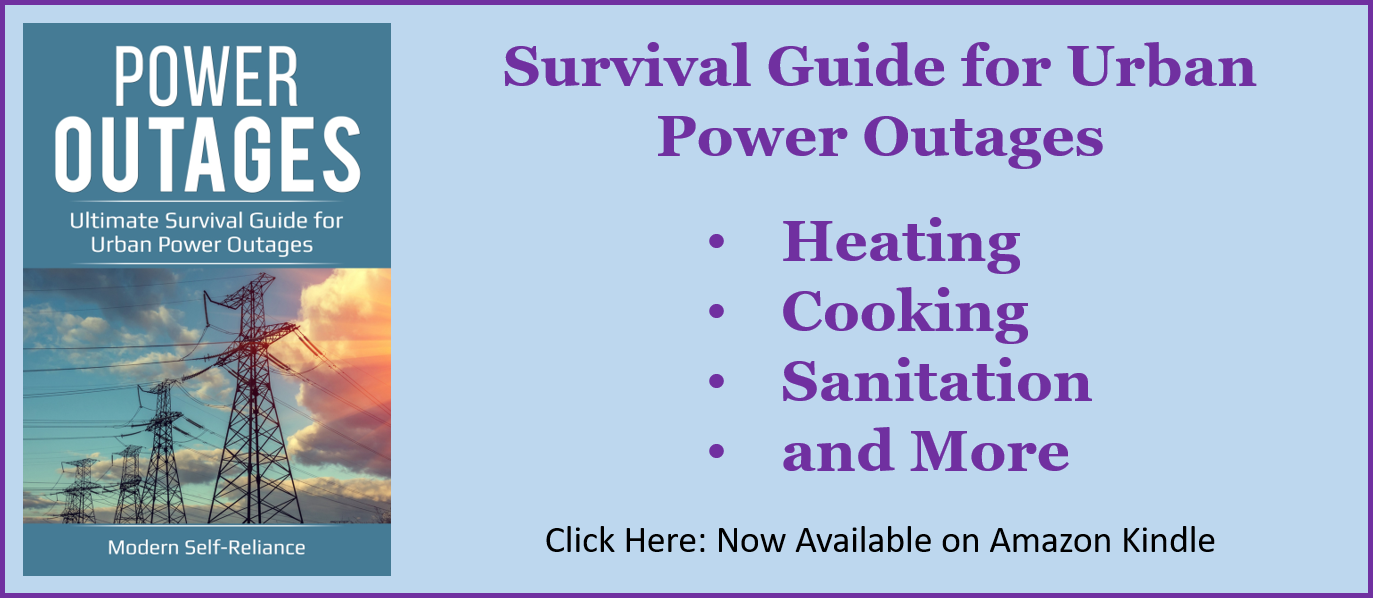We may earn a small commission from any link to any products or services from this website. Your purchase helps support our work in bringing you real information about homesteading skills and preparedness.
Keeping clean is important not only for disease control but also for your morale. A clean cooking and living environment can control the spread of bacteria but it also can maintain a sense of dignity in crisis situations.
This article is part 3 in our series on preparing for long-term and short-term power outages. If you missed the first two they can be found here:
- 5 Steps to Evaluating Water Security during a Power Outage
- 8 Steps to Evaluating Food Preparedness for Power Outages
Sanitation During a Power Outage
#1 Will you still have running water?
I do cover water for drinking and cooking in Part 1 on -----5 Steps to Evaluating Water Security during a Power Outage----- however water is also an important part of sanitation.
If you are connected to city water the pressure will likely hold for a few days during a power outage. If you rely on a pump you will need a backup source for water or power.
Hopefully you have some water stored for drinking, also check out ----- Water Storage for Today, This Month and This Year -----.
#2 Will you still have sewer connection?
For those connected to the city sewer, and city water, you will still be able to flush your toilet for some time. This is a great advantage for short-term power outages. You won't have to deal with a major component of sanitation, right away.
The other option you may have is a septic tank of which you can still flush waste if you have water to flush with. Check that your septic tank does not run a pump, which may cause backups of your septic system.
(The third option is you use a composting toilet or outhouse in which your bathroom is already power-free and you are all set.)
- Edited: During conditions of major flooding or longer power outages city-connected sewer systems may back flow into your home. This happens when your home is at a lower elevation than the sewage, or there is a clog someplace. Some sewer plants rely on pumps to move sewage that would fail without power. This is more prone for basement toilets rather than main floor or higher toilets.
- Sewage backup: If you are able, there are check values that can be installed between the toilet and the sewer line to enable only one-way flow. If you owned your home you could also install a shut-off valve between your home and the sewer line. With all of these valves, if the pressure behind them is too great then it may fail. However it may provide protection against minor back flow cases.
#3 What to do without a flush-able toilet?
For the case where you don't have excess water to flush with or don't have system to flush human waste you will need a plan to handle it.
- 5 gallon bucket: One option is to get a 5 gallon bucket and double line it with trash bags. Attach a toilet seat (for comfort) and use that instead. After leaving a deposit in the bucket add kitty litter or saw dust or wood chips to cover the smell. A small amount of bleach could also be added if desired. Replace the trash bags well full. This toilet has the advantage of being mobile.
- Own toilet: If you toilet isn't flushing double line it with a trash bag. Duct tape the edges of the bag to the toilet to prevent the bag from coming off. Add kitty litter to absorb liquid and smells. Replace when needed. This method has the added relief of you feeling like you are using a real toilet. This may provide a bit of morale over squatting in a pot in the corner.
- Composting toilet: While an apartment manager may not approve of this method, homeowners with a garden may be interested in a composting toilet. This uses no power or water to start with and could be a great asset during a power outage, as it would be one less thing to worry about. The idea is to separate liquid from the solid, compost the solid and use as fertilizer. The liquid can be used straight on the garden as a good source of phosphorus. (Think N-Pee-K fertilizer.) Learn about the proper methods for composting human waste in this book: The Humanure Handbook: Guide to Composting Human Manure by Joseph Jenkins.
- Portable latrine. There is a powder in diapers that turns into a gel to absorb liquid and prevent spills. The powder also neutralizes odor and starts to break down solid waste. This powder can be bough raw (here from CleanWaste) or in portable latrine units. This could be a good medium-term solution to liquid sanitation. There are also waste bags that leave no trace backpackers use, without the toilet seat.
#4 Do you have the supplies to keep clean while preparing food?
While the power goes out, you will need a method to continue to cook and prepared food. Check out ----- 8 Steps to Evaluating your Food Preparedness for Power Outages ----- for recommendations on what to do for food during power outages.
However, one big part of food is sanitation. Keeping clean while you cook. There are some simple steps to reduce water needs and still maintain a clean environment for cooking.
- Plastic Cutlery: Plastic forks, spoons and knives can help reduce the need for water for cleaning. These can be one-time use items or one per day items. They can be individually wrapped like you might find in your Chinese food take-out bag. The individually wrapped will keep the whole set from being contaminated by a single event like a spill. This will allow you to use real utensils and also not have to wash your cutlery too.
- Paper plates and bowls: While it's not classy or environmentally friendly, paper plates can also save dishes. This will save water needed for cleaning and provide an instantly clean surface for placing your food. While this is not a long-term solution, in the short-term to reduce water consumption and to avoid piles of dirty dishes, paper plates and bowls are a great solution. They are also cheap and double as kids' crafts when you are bored.
- Napkins and paper towels: While we use cloth napkins normally, these get thrown in the washing machine with our laundry. During a power outage, we will revert to paper towels for cleaning spills, wiping hands and surfaces. Paper towels are bulky to store, but can help keep the place clean.
#5 How can you keep clean with limited water?
Remember you may not have running water for a shower, brushing your teeth or washing counters.
- Keeping hands and bodies clean: Alcohol based hand sanitize is good for killing germs but doesn't remove dirt. Soap is great at removing dirt but requires water. A happy medium can be found in baby wipes! Before you laugh, many Marines are well accustomed to the baby-wipe shower while deployed in the field. Baby wipes provide the cleaning agents, a refreshing feel and also remove dirt as well. A quick wipe down of all the important parts can keep you happier and healthier.
- Keeping teeth clean: Do you have a good stock of toothpaste, tooth-brushes, and mouthwash? While water is short, you can brush your teeth like normal but rinse with mouthwash. This will keep your mouth clean and reduce water required. In a pinch, baking soda can be used in place of toothpaste.
- Keeping "other" parts clean: We are adults here, when entertainment is short, human couples often return to natural amusements for fun. Stocking extra condoms for power-outages is probably a very over-looked item to consider.
- Keeping hard surfaces clean: Bleach is the greatest cleaner and killer of all things nasty (in my opinion). While we can debate whether completely sterile environments are a good thing or they make space for breeding bad bacteria but when times are tough, and you need a clean counter to change a baby or make food; chlorine bleach is the way to go. While liquid bleach does expire and lose it's effect over time, there are also concentrated bleach granules that store more compactly. Then you can "make" bleach by diluting in water. Another option would be bleach wipes, or paper towels with bleach built in. Either one can clean a floor, counter or toilet in a pinch.
#6 Do your children require diapers?
Even if you cloth diaper, if water is short, you may want to stock some disposable diapers for them. Just like you normally use real plates, but use paper plates during a power outage. It may be advantageous to have diapers and more baby wipes for the tots.
#7 Do your pets require any sanitation precautions?
Depending on the pet, there may be different needs for keeping clean. Do the methods you use for handling pet waste require lots of water or power?
What can you do during a power outage to keep your pets clean and happy? I won't try to make a general recommendation for pet/pet-keeping methods.
Steps To Take Today
- Evaluate you water source and consider human waste handling methods for power outages.
- Invest in disposable items (paper plates, cutlery, diapers, etc) to reduce water needs for cleaning.
- Stock up on cleaning supplies like bleach and wet wipes.
In Conclusion
Keeping clean isn't hard when the water runs freely and the toilets properly flush. However when the power goes out, it may mean levels of sanitation could slip. You family still needs to have clean food preparation areas to avoid contamination and a method to dispose of human waste. Consider these 7 steps and you will be well ahead of your neighbors if the lights ever go out.
What are you methods for keeping clean? Do you think I missed a critical component of sanitation during power outages? Thanks for reading!
Did you know this is the third article in our Power Outage Series? Check out the rest of our series.

- Fitness: Working Out as Physical Preparedness - February 22, 2021
- Backpacking or 72hr bag meals - December 23, 2020
- 8 Security Concerns for a New Home - October 28, 2019




Questions: who is Joseph Jenkins, and why would I only compost HIS manure?
Why was there no advice on what to do BEFORE the municipal sewer system stops[electric pumps stop in grid down] and the raw sewage REVERSES flow back to your house and back wards up your pipes and toilet and sink etc. ???
RJ,
There are some check valves that can provide some back-flow protection. The amount of protection they provide will depend on the pressure they are rated for and the pressure of the sewage back flow. I added a small section above.
Thanks for reading.
Do you children???
Do you pets ???
I’m still laughing…proofread maybe???
Wood ashes from your stove works as good as kitty litter & is free if you use burn wood..
I put about 4 inches in bucket before use & after use cover waste with another layer. No smell & when you dump the ashes & waste slide out leaving a clean bucket.
Thanks for commenting. This seems like a great method if you have both a composting toilet and wood stove.
If power is lost for any significant time, many people will be forced out of their homes due to sewage backup. If you live below a lift station, you will eventually get back flow of sewage into you home.
Thank you for bringing this to my attention, I have added in a section about sewage back flow.